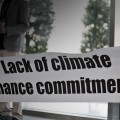Snippets from Bonn: Day One
Linh Do | September 1, 2015.
As day two of the UN climate change negotiations (UNFCCC) commence in Bonn, Germany, The Verb explores some burning issues up for discussion this week.
Why is there spilt milk over five years?
2015 has seen over 50 Intended Nationally Determined Contributions (INDCs) submissions, representing 60 per cent of global greenhouse gas emissions, detailing how governments will be curbing their emissions.
As expected, many of these submissions fall short of what is actually needed. Notable standouts, according to the Climate Action Tracker tool that evaluates the adequacy of these submissions, include Morocco and Ethiopia. Without governments increasing their ambition and commitments, climate science shows that it won’t be possible to limit warming to 1.5°C.
Climate Action Network (CAN) are leading the charge in pushing for an outcome that is not only legally binding but also inclusive of five-year commitment periods. This will allow governments to “ratchet” or scale up their commitments.
A number of governments, which is again unsurprising upon examining their submissions, are eager to have ten-year cycles as this will alleviate the political pressure of increasing their contributions. Unfortunately, and regardless of how the coin lands, this doesn’t speak to the environmental necessity to act on climate change.
Does the UNFCCC have its own “Silicon Valley”?
Rarely does a day pass without news over Silicon Valley’s latest investment round. Contrastingly, technology is oft spoken about within the hall ways of the UN climate change negotiations as concerns at the lack of financial commitment to making technology more accessible bubbles to surface.
Investment from governments, and also the private sector, won’t result in a new app available for download. Instead, it will offer up financial and technical assistance to developing countries through the “Technology Mechanism” around the implementation of new energy sources. This would allow for the lowering of barriers that often prevent new players entering the market, and facilitates increased research and development.
Climate negotiators could take a leaf out of Silicon Valley’s book when it comes to willingness to explore new frontiers via technology, as best highlighted through “climate hero” Elon Musk.













comment